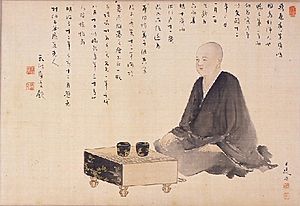Hon'inbō Shūsaku facts for kids
Quick facts for kids Honinbo Shusaku |
|
|---|---|
 |
|
| Full name | Hon′inbō Shūsaku |
| Kanji | 本因坊秀策 |
| Born | June 6, 1829 Innoshima, Bingo Province, Japan |
| Died | September 3, 1862 (aged 33) Edo, Japan |
| Teacher | Honinbo Shuwa |
| Rank | 7 dan pro |
Honinbo Shusaku (born Kuwabara Torajiro; June 6, 1829 – September 3, 1862) was a famous Japanese professional Go player. He lived in the 19th century. People called him Invincible Shusaku. This was because he won 19 games in a row. These wins happened during special annual games.
Shusaku is also known for his long match against Ota Yuzo. He also created a special way to start a Go game. It is called the Shusaku opening. After he died, people honored him as a "Go sage." This means he was seen as a very wise and skilled Go master. Many believe he was the strongest player from 1847 until his death. His teacher, Honinbo Shuwa, was also very strong.
Contents
Honinbo Shusaku's Life and Achievements
Shusaku earned the nickname "Invincible." He got this name after winning 19 games in a row. These wins were in the annual castle games. These were important games played for the Japanese ruler. Some people thought his teacher, Honinbo Shuwa, was even stronger. Shusaku always played with black pieces against his teacher. This made it hard to compare their skills directly.
Shusaku was one of only three people to be called a "Go Sage" (Kisei). The other two were Honinbo Dosaku and Honinbo Jowa. This title is very special in the world of Go.
Early Life and Training
Shusaku was born on Innoshima island in Japan. His family were merchants. When he was young, a local lord named Asano Tadahiro noticed his talent. Lord Asano became his supporter. He allowed Shusaku to study Go with a professional priest named Hoshin.
By age eight, Shusaku was already very good at Go. In 1837, he left home to join the Honinbō school. This was the most important Go school in Japan. He officially became a student of Honinbo Jowa. But he mostly learned from older students. On January 3, 1840, he earned his first professional rank. This rank is called shodan.
|
|
|||||||||||||||||||||||||||||||||||||||||||||||||||||||||||||||||||||||||||||||||||||||||||||||||||||||||||||||||||||||||||||||||||||||||||||||||||||||||||||||||||||||||||||||||||||||||||||||||||||||||||||||||||||||||||||||||||||||||||||||||||||||||||||||||||||||||||||||||||||||||||||||||||||||||||||||||||||||||||||||||||||||||||||||||||||||||||||||||||||||||
| The "ear-reddening" move |
Shusaku's Quick Rise to Fame
Shusaku made great progress in his Go career. He reached the rank of 4 dan in 1844. In 1846, he played a famous game against Gennan Inseki. Gennan was one of the strongest players at that time. Shusaku played with a handicap at first. But Gennan saw how strong Shusaku was. So they started a new game. Shusaku played with the black pieces.
This game became known as the "ear-reddening game." During the game, Shusaku made a surprising move. A doctor watching the game noticed Gennan's ears turned red. This showed that Gennan was very surprised by Shusaku's move. In the end, Shusaku won the game by two points.
After this, Shusaku was promoted to 5-dan. He was also chosen to be the next head of the Honinbo house. This was a very important position. Shusaku eventually reached the rank of 7-dan. People generally agreed he was the strongest player, except for his teacher, Shuwa.
The Sanjubango Match
In 1853, a group of Go players discussed Shusaku's skill. They thought he was the strongest player of his time. But Ōta Yūzo disagreed. He was in the middle of a series of games with Shusaku. They were tied at three wins each. A famous Go sponsor, Akai Gorosaku, heard this. He decided to sponsor a huge 30-game match. This match was called a Sanjubango.
The match started in 1853. Ota was 46 years old and a 7 dan player. Shusaku was 24 and a 6 dan. The games were played once a week. Ota did well at first. But Shusaku started to win more games. After 17 games, Ota was behind by four games. The match was eventually stopped.
Shusaku's Death and Lasting Impact
In 1862, a serious illness called cholera spread across Japan. Shusaku helped care for sick people in the Honinbō house. He also became ill himself. Shusaku died from cholera on September 3, 1862. He was only 33 years old.
Shusaku's legacy lives on in the world of Go. He is known for the Shusaku fuseki. This is a special way to start a Go game with the black pieces. He perfected this opening style. It was very popular until the 1930s.
Fiction
Shusaku is also a character in the popular manga and anime series Hikaru no Go. In the story, Shusaku found the spirit of a fictional Go player named Fujiwara-no-Sai. Shusaku then became the person through whom Sai played many great Go games.
See also
 In Spanish: Hon'inbō Shūsaku para niños
In Spanish: Hon'inbō Shūsaku para niños
Images for kids
 | Mary Eliza Mahoney |
 | Susie King Taylor |
 | Ida Gray |
 | Eliza Ann Grier |


